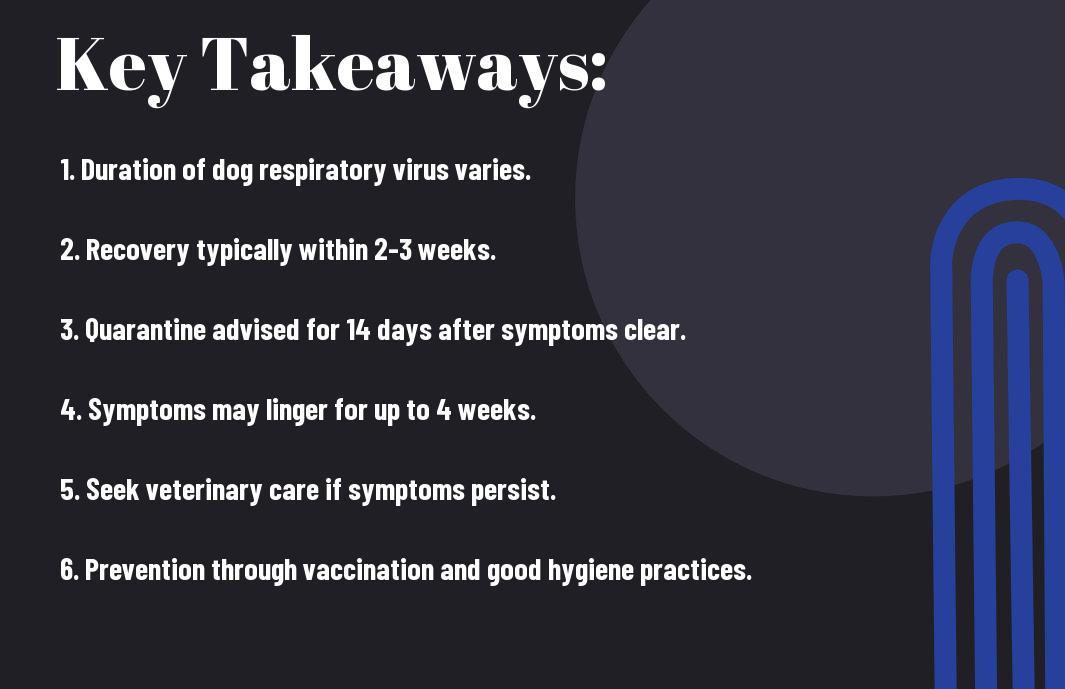Duration plays a crucial role in understanding how long a dog respiratory virus can last and how it may affect your furry friend. From the initial onset of symptoms to the recovery phase, it is important to be aware of the timeline of a dog respiratory virus to effectively manage and treat it. Let’s investigate into the typical duration of this common concern among dog owners.
Key Takeaways:
- Dog respiratory viruses can last for 2-3 weeks: These viruses typically have an incubation period of 7-10 days and can continue to be contagious for up to 2-3 weeks.
- Viral shedding can occur even after symptoms have resolved: Dogs infected with a respiratory virus can shed the virus for some time after they have recovered, making it important to exercise caution during this period.
- Vaccination and proper hygiene practices are crucial: Vaccination against common respiratory viruses, along with good hygiene practices such as regular hand-washing and cleaning of dog’s living spaces, can help prevent the spread of these infections and reduce their duration.
What is a Dog Respiratory Virus?
The Canine infectious respiratory disease complex (Kennel Cough) is a highly contagious respiratory infection in dogs that affects the upper respiratory system. This disease is commonly referred to as ‘kennel cough’ because it often spreads in places where dogs are in close proximity to each other, such as boarding facilities, dog parks, and shelters. Kennel cough can be caused by a variety of viruses and bacteria, making it necessary for dog owners to take preventive measures to protect their pets.
Definition and Causes
To understand what a dog respiratory virus is, you need to know that it is an infection that affects your dog’s respiratory system. The most common cause of these viruses is exposure to other infected dogs. When a sick dog coughs or sneezes, respiratory droplets containing the virus can spread in the air and be inhaled by nearby dogs. Additionally, dogs can contract respiratory viruses through contaminated surfaces or shared water bowls.
Common Types of Respiratory Viruses in Dogs
What are the common types of respiratory viruses in dogs? Here is a breakdown of some of the most prevalent viruses that can affect your furry companion:
| Canine Distemper | Infects the respiratory, gastrointestinal, and nervous systems |
| Canine Parainfluenza Virus | Causes a dry, hacking cough |
| Canine Adenovirus Type 2 (CAV-2) | Leads to respiratory and ocular symptoms |
| Canine Herpesvirus | Primarily affects newborn puppies |
| Bordetella bronchiseptica | Commonly associated with kennel cough |
- Perceiving the symptoms early and seeking veterinary care can help in managing the condition effectively.
- Importantly, maintaining your dog’s vaccination schedule is crucial in preventing these respiratory viruses.
Symptoms of Dog Respiratory Virus
Even though dog respiratory viruses can vary in severity, they often present similar symptoms. These symptoms can range from mild to severe, depending on the virus strain and the overall health of your dog.
Mild Symptoms
An early stage of the dog respiratory virus may manifest with mild symptoms such as a persistent cough, sneezing, nasal discharge, and mild fatigue. Your dog may also exhibit a slight decrease in appetite, but overall, they may still be active and responsive.
Severe Symptoms
Respiratory distress, high fever, severe coughing fits, lethargy, and nasal discharge that becomes thick and discolored are signs that the dog respiratory virus has progressed to a more severe stage. In severe cases, your dog may struggle to breathe, show signs of dehydration, and even lose interest in food and water.
Respiratory viruses in dogs can sometimes lead to secondary infections like pneumonia if left untreated. It’s crucial to monitor your dog closely if you notice any severe symptoms and seek prompt veterinary care.
When to Seek Veterinary Attention
To determine when to seek veterinary attention for your dog with a respiratory virus, you should closely monitor the progression of their symptoms. If your dog’s condition worsens, they display severe symptoms, or if they are not improving with at-home care, it’s time to consult your veterinarian.
The respiratory system in dogs is delicate, and any prolonged respiratory distress can have serious consequences. Your veterinarian can provide the appropriate treatment, supportive care, and medications to help your dog recover safely and effectively.
Diagnosis and Testing
Physical Examination
Diagnosis of a respiratory virus in your dog begins with a thorough physical examination by your veterinarian. They will check for symptoms such as coughing, sneezing, nasal discharge, and respiratory distress. Your veterinarian may also listen to your dog’s lungs and check for any signs of fever. Based on the physical examination findings, further testing may be recommended to confirm the presence of a respiratory virus.
Laboratory Tests
One of the common methods used to diagnose a respiratory virus in dogs is through laboratory tests. These tests may include blood tests, nasal swabs, or throat swabs to identify the specific virus causing the respiratory symptoms in your dog. These tests can help your veterinarian tailor the treatment plan to address the specific virus affecting your dog.
With laboratory tests, your veterinarian can also determine the severity of the infection and whether your dog may be at risk of developing complications. Early detection through laboratory testing can help initiate appropriate treatment and prevent the further spread of the virus to other pets in your household or community.
Imaging Studies
Imaging studies, such as x-rays or ultrasound, may be recommended in some cases to evaluate the extent of respiratory infection in your dog. These studies can help visualize any abnormalities in the lungs or airways that may be contributing to your dog’s respiratory symptoms. Your veterinarian may use imaging studies to monitor the progression of the virus and the response to treatment over time.
Another important aspect of imaging studies is to rule out other potential causes of respiratory symptoms in your dog, such as pneumonia or foreign body obstruction. By conducting imaging studies, your veterinarian can ensure a comprehensive evaluation of your dog’s respiratory health and provide the most appropriate care for their condition.
Treatment and Management
Supportive Care
Supportive care is crucial in managing a dog respiratory virus. Make sure your dog is warm, comfortable, and well-hydrated. You can offer your furry friend some warm chicken broth or water to keep them hydrated. Encourage rest and limit their physical activity to allow their body to fight off the virus effectively.
Medications
To help alleviate symptoms such as coughing or nasal congestion, your veterinarian may prescribe medications such as cough suppressants or antibiotics if a secondary bacterial infection is present. It is necessary to follow your vet’s instructions diligently and complete the full course of medications to ensure the best possible outcome for your dog.
Some antiviral medications may be available for specific respiratory viruses in dogs. Your veterinarian will be able to determine if such medications are necessary for your dog’s recovery. Always consult with your vet before giving your dog any over-the-counter medications, as some can be harmful to your pet.
Home Care and Prevention
Medications prescribed by your vet should be administered according to their instructions for the specified duration. Ensure that your dog gets plenty of rest and remains warm during the recovery period. It is also necessary to keep your dog away from other dogs to prevent the spread of the virus.
Duration of Dog Respiratory Virus
Average Recovery Time
With proper care and treatment, most dogs infected with a respiratory virus will show improvement within 7 to 10 days. However, the average recovery time can vary depending on the type of virus, the overall health of the dog, and the severity of the symptoms.
Factors Affecting Recovery
For a faster recovery, make sure your dog gets plenty of rest, stays hydrated, and eats a nutritious diet. Additionally, factors such as age, vaccination status, and any underlying health conditions can influence how quickly your dog bounces back from a respiratory virus.
- Thoroughly clean and disinfect your dog’s living area to prevent reinfection.
- Monitor your dog closely for any signs of worsening symptoms.
Factors like stress, poor nutrition, and a weakened immune system can prolong the recovery process for your dog. It’s important to create a stress-free environment and provide the necessary care and attention to help your furry friend recover effectively.
- Though most dogs recover fully from respiratory viruses, complications can arise in certain cases.
Potential Complications
Average complications from a respiratory virus in dogs include secondary bacterial infections, pneumonia, and dehydration. These complications can prolong the recovery period and may require additional treatment from your veterinarian.
For instance, if your dog shows persistent or worsening symptoms despite treatment, it is crucial to seek veterinary care promptly. Your veterinarian may recommend further diagnostic tests or adjustments to the treatment plan to ensure your dog’s swift recovery.
Prevention and Vaccination
Vaccination Options
To protect your dog from respiratory viruses, vaccination is vital. You can consult your veterinarian to determine the appropriate vaccination schedule for your pet. There are different vaccines available that can help prevent respiratory infections in dogs, such as the canine distemper vaccine, adenovirus vaccine, parainfluenza vaccine, and Bordetella bronchiseptica vaccine.
Preventing the Spread of Infection
An important aspect of preventing the spread of respiratory viruses is to isolate infected dogs from other pets. Additionally, practicing good hygiene, such as washing your hands after handling sick dogs and cleaning and disinfecting your dog’s living area regularly, can help reduce the spread of infection.
Spread of respiratory viruses can also occur in places where dogs congregate, such as dog parks, boarding facilities, and grooming salons. It is vital to avoid these places if there is an outbreak of a respiratory virus in your area to minimize the risk of infection.
Boosting Your Dog’s Immune System
On top of vaccination, maintaining a healthy lifestyle for your dog is crucial in boosting their immune system. Providing a balanced diet, regular exercise, and reducing stress can help strengthen your dog’s immune response to respiratory viruses. Additionally, certain supplements and probiotics may also aid in supporting your dog’s immune system.
For instance, ensuring your dog receives an adequate amount of Vitamin C and E, as well as Omega-3 fatty acids, can contribute to a stronger immune system. Consulting with your veterinarian about the best ways to boost your dog’s immune system is recommended for optimal health and protection against respiratory viruses.
Final Words
On the whole, the duration of a dog respiratory virus can vary depending on the specific virus your dog has contracted. In general, most respiratory viruses in dogs will last anywhere from 7 to 21 days. However, it is important to monitor your dog closely and seek veterinary care if you notice any concerning symptoms or if your dog’s condition does not improve within a week.
Note, the best way to protect your furry friend from respiratory viruses is to ensure they are up to date on vaccinations, practice good hygiene, and avoid contact with sick animals. By being proactive and attentive to your dog’s health, you can help them recover from a respiratory virus quickly and prevent future infections.
FAQ
Q: What is a dog respiratory virus?
A: A dog respiratory virus is a contagious infection that affects a dog’s respiratory system, including the nose, throat, and lungs.
Q: How long does a dog respiratory virus last?
A: The duration of a dog respiratory virus can vary depending on the specific virus and the dog’s overall health. In most cases, the virus may last for 1-3 weeks.
Q: What are the common symptoms of a dog respiratory virus?
A: Common symptoms of a dog respiratory virus include coughing, sneezing, nasal discharge, fever, lethargy, and difficulty breathing.
Q: How is a dog respiratory virus transmitted?
A: A dog respiratory virus can be transmitted through direct contact with an infected dog, airborne droplets from coughing or sneezing, or contact with contaminated surfaces.
Q: How can a dog respiratory virus be treated?
A: Treatment for a dog respiratory virus typically involves supportive care, such as rest, hydration, and possibly medications to alleviate symptoms. In severe cases, hospitalization may be necessary.
Are strawberries toxic for dogs
Your Dog’s Allergies: Expert Advice
Demystifying Anal Gland Issues in Dogs: Your Comprehensive Guide from the American Kennel Club




